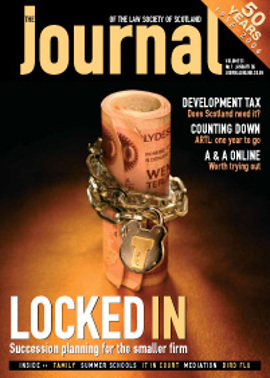A difficult birth

The deadline for this article is just before Christmas, as celebrations purportedly to mark a new arrival are about to begin. Licensing lawyers are marking the arrival of their new baby, the final version of the Licensing (Scotland) Bill. One hopes that the ambience in that stable in Bethlehem was considerably calmer than the chaotic scenes which accompanied the birth of the baby Act. Writing in the Times the following day, Magnus Linklater described “wild horse trading, ill thought out measures spilling out on to the floor, proposals that lurched into the Bill then staggered out of it again”. In his summary, “binge amending of the worst kind”.
The Nicholson Committee had recommended that there be no specified permitted hours. Each licensing board should be entitled to consider the hours which each licensee proposed in his operating plan, and to decide on the merits of each case. After publication of the draft bill, some concern was expressed about off sales being available on a 24 hour basis, perhaps fuelling post-club excesses. The Scottish Grocers’ Federation had suggested 7am–11pm, covering the average range of hours opened by most non-national convenience stores. The final night’s proceedings on the site of the former brewery saw amendments proposing closure at 3am, followed by opposing amendments from supposed coalition partners. The amendment which won the day will see off sales permitted from 10am-10pm. This abolishes the anachronism of the Sunday hours, but otherwise means that off sales will start two hours later than the present permitted 8am opening. This victory was hailed by its supporters as a triumph in the fight against binge drinking. Where the evidence for this doubtful proposition is to be found has not been revealed to me.
Most of the original bill survived the debacle relatively unscathed. Those changes which were made were primarily sensible ones in response to consultation. There will be mandatory training standards for licensing standards officers. Importantly there will be provision for occasional extensions of permitted hours over and above those which are set out in the operating plan.
We now have to hope that the transitional arrangements can move on to bring the new system into being in a sensible and non-confrontational way. It will be interesting to see what guidance comes from the newly formed National Licensing Forum, as this will set the tone for individual boards. What I wish for more than anything, yet have the greatest fears over, is that policy will not be made on the hoof, on the basis of a bright idea which comes to one influential councillor on the morning of a board meeting. Ill thought-through ideas create confusion, inconsistency and resentment. It will be easy for the new regime to degenerate into the current patchwork system if the process is not managed carefully and thoughtfully. The licensed trade must be consulted, and clear standards agreed by all parties. The trade must address current issues of concern and come up with clear strategies for improvement. Local authorities must play their own part. If a vibrant night time economy is used to promote tourism, there must be an infrastructure to back it up. Unfortunately no one can legislate for the Scots’ current alcohol consumption habits. As Allan Massie wrote in the Sunday Times, we need to change our drink culture, not the law. That unfortunately is beyond the scope of any of the relevant parties, and may prove to be the one factor which makes part of the Act unworkable.
It is hard to be confident about sensible progress after looking at the Holyrood experience. When one learns that the Minister for Finance and Public Service Reform announced that the effect of the bill would be that “for the first time” licensing boards would have the power to refuse licences on the basis of overprovision and suitability, the true nature of the shambles comes home. These provisions have of course been at the heart of the 1976 Act which the bill replaces. Perhaps the best we can hope for is that every licensing professional who will carry forward the reforms has looked over their shoulder, shuddered, and resolved to do better.
Tom Johnston,
Partner, Young & Partners,
Business Lawyers,
Dunfermline and Glenrothes
In this issue
- Pressing ahead
- Regulation, 2006 style
- Held to ransom?
- A world turned upside down
- Quiet revolutions
- For supplement read tax
- Why mediation is a bad idea, and other myths
- Advice in a Europe of many notions
- At the touch of a button
- What sort of courts do we want? (And when?)
- KM in practice
- If the bug bites
- Refreshing risk quiz
- The partnership must go on
- First duty to the court
- A difficult birth
- Nuclear power no thanks?
- Due diligence
- Will less mean better?
- Scottish Solicitors' Discipline Tribunal
- Website reviews
- Book reviews
- Back to the future
- Users' IT requirements for ARTL






